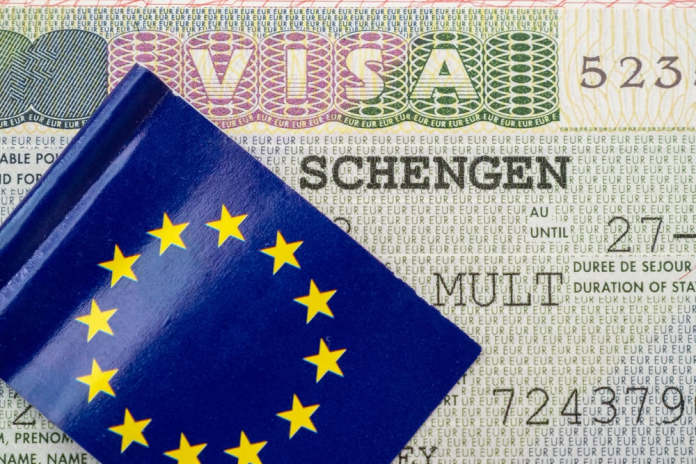
Iraq and The Gambia have both been targeted with EU visa sanctions due to non-cooperation on deportations, and it seems the measures – or the threat of them – may have led to a new willingness to accept deportation flights from EU states. The instrument was first introduced in 2019, and was first applied to The Gambia in 2021. Now member states are discussing the way ahead for the visa sanctions regime, which may see more threats levelled at third countries deemed insufficiently cooperative with EU deportations.
Success story for visa sanctions?
The Gambia is the only country against which the EU has implemented visa sanctions, which were introduced by 2019 amendments to the EU Visa Code. Gambian citizens were subjected to an increased processing time for Schengen visas (as of 2021) and an increased fee (as of 2022). The measures were introduced by the EU after mass protests in The Gambia saw the government introduce a moratorium on accepting deportations.
However, in interviews last year with the author of this article, Gambian activists suggested the choice to target the country may have also had to do with its size. With a population of just 2.6 million people, they feel the country has sometimes become a site of experimentation for new European policies.
They argued that it was unfair to single out Gambia, which has actually historically permitted a relatively high number of deportations per capita, in spite of the many hardships associated with deportation for the country.
Even before the EU’s sanctions, there were many other difficulties associated with submitting a visa application: costs for paperwork and travel (visa applicants from Gambia must typically travel to neighbouring Senegal, as most EU countries do not process visa applications directly in the country); and the difficulty of even getting an appointment. These have become something of a precious commodity – in Dakar, street advertisements promise visa appointments for hundreds of euros.
On 16 January this year, the sanctions were eased (pdf) through a lifting of the increased visa fee, after what the Council of the EU described as “substantial and sustained improvement in the cooperation on readmission was established with regard to the organisation of return flights and operations.” Regular charter flights have headed to the country over the past year.
While this may make an application for a Schengen visa cheaper, it is unlikely to make visas any more accessible – in 2022 The Gambia faced the highest visa rejection rate of any country featuring in the Commission’s annual cooperation report, at 57%.
Lamin Mokendeh Darboe, former director of the Gambian National Youth Council, noted that the number of Gambian citizens able to travel to the EU was restricted even before sanctions hit. “The reality is not so many people were getting visas anyway,” he said. “This is why people take irregular channels to travel, there are limited alternatives”.
Meanwhile, the increased visa processing times remain in place, with the Council Decision easing sanctions on The Gambia saying:
“…cooperation on readmission with The Gambia remains insufficient with regard to the assistance provided in the identification of Gambian nationals illegally staying on the territory of all Member States, the timely issuance of travel documents, and the capacity and frequency of charter flights to allow for a sustainable reduction of the number of Gambian nationals illegally staying in the Member States.”
“Possible improvements”
A Council Presidency discussion paper obtained by Statewatch (pdf) argues that after several years of experimentation, it is now “a good time to take stock of how the Article 25a mechanism has been applied and its actual consequences on readmission cooperation with third countries” and identify “possible improvements”.
While the EU’s stance towards The Gambia has yielded some of the desired results, the paper claims that Iraq is a bigger success story – in July 2021 the EU threatened visa sanctions, and although they were never implemented it appears they may have contributed to changing the country’s practices to meet the EU’s demands, with the number of deportations to Baghdad increasing.
“Lessons learned from the Iraqi case have shown that setting a deadline against which to evaluate whether satisfactory progress in the readmission cooperation has been made, can bear fruits,” says the Presidency’s discussion paper.
“Following this approach, in case by the end of the set deadline – which has to be clearly communicated to the concerned third country – no significant and concrete progress is observed, the Council then proceeds to the adoption of the restrictive visa measures.”
Sanctions have also been formally proposed against Bangladesh, Senegal, and, most recently, Ethiopia. Yet the proposals have not, so far, been implemented. “The power of the mechanism lies in the political message conveyed by the proposals, rather than the measures themselves,” argues the Presidency’s report.
This may lead to more threats in the future, with the paper highlighting that “the tabling of proposals increases the probability of the third countries’ readiness to engage on readmission and improve their cooperation.”
It also notes the European Council’s regular calls “to use the leverages available towards the third countries that do not cooperate sufficiently on readmission”. Visa sanctions are just one of the tools used by the Council to try to force more deportation compliance—linking compliance to development aid, for instance, has also been discussed.


